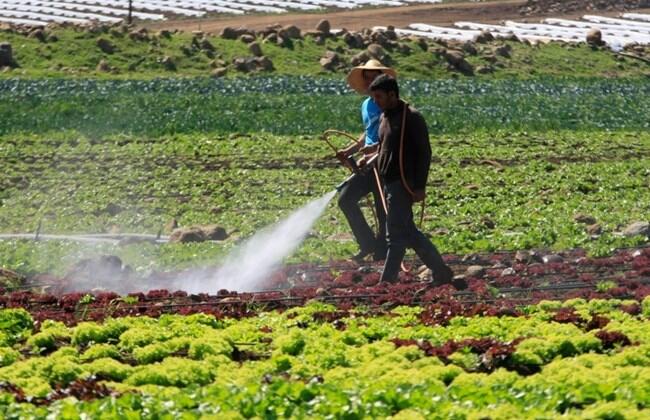Syrian laborers perform every task on the farm: plowing the land, administering chemical fertilizers, harvesting the crops and packaging produce for transport. But General Security’s decision to restrict the entry and residency permits of Syrians in Lebanon has hit farmers and investors, with workers becoming subject to a Kafala sponsorship system. Some Syrian workers are seasonal, and may stay in Lebanon for only a couple of months. But many now see the high cost of entering Lebanon as outweighing the benefits and are more hesitant to come. The Lebanese government has also barred Syrians who register for refugee status with UNHCR from working in the country, forcing them to sign pledges not to work. The Lebanese workforce been so far been unable compensate for the loss. Agricultural projects often require hundreds of workers, and landowners say the sector is facing a major shortage of labor. A lack of sufficient labor can affect farmers’ yields even after planting. When harvest time comes, fruits and vegetables rot on the vine if they cannot be picked quickly enough, and farmers can stand to lose a significant portion of their crop to spoilage if it cannot be brought quickly to market. After the liberation of south in 2000, investors began purchasing plots in the valley of Marjayoun, close to the border with Israel. The same thing was done in the Sarrada-Wazzani Valley, as farmers began to transform the uncultivated lands into vegetable fields. Francis Abu Rahal, an investor in the agricultural sector, said that after the liberation, investors turned to Syrian laborers, who used to arrive in large numbers for the seasonal work. But he said the numbers have fallen in the last few years, as the Syrian war drags on. “The agricultural sector in Lebanon depends completely on Syrian labor, there’s [almost] no Lebanese labor,” Abu Rahal said. “And [when] we tried to bring in workers from the surrounding villages, we didn’t find any, so how can we provide [enough] Lebanese workers for agricultural projects that need 200 to 250 workers?” Abu Rahal said project owners and investors suggested to then-Agriculture Minister Hussein Hajj Hassan that they be allowed to bring in workers from Bangladesh, but he refused and said there was no support for the idea in the government. Laborers from Bangladesh are hard workers and can come to Lebanon for three years, which is better, Abu Rahal said. He criticized the government for being irresponsible, adding that it is indifferent to the sufferings of agricultural investors. “We ask the Lebanese government to allow us to bring in workers and to reduce … the costs for investors and project owners,” he said. “Workers coming in could be limited to agricultural camps so they don’t constitute a danger to security. Security forces could monitor them and follow up on their situation whenever they want.” During a tour of the agricultural fields and produce-packing centers in the Marjayoun and Sarrada-Wazzani valleys, The Daily Star spoke with farmers and Syrian workers, who were busy harvesting this season’s crops. Farmers said they were feeling the the implications of the government’s restrictive policy. “This season’s [fruit] has matured on the tree, and there aren’t enough Syrian laborers to harvest it,” explained Mohammad Sheet. “I only have 25 workers where I should have 150, and the reason goes back to the difficulties in the entry measures for those workers.” Farmers said the labor shortage was compounded by the difficulty of exporting their produce. Lebanese exporters were hit hard in April, when the Nusra Front and other Islamist groups took over the Nassib crossing between Syria and Jordan. It was the last major crossing between Jordan and Syria controlled by the Syrian regime. “Until now, the government hasn’t found a solution … through ferries and boats or [other means],” Sheet said, calling on the government and Agriculture Minister Akram Chehayeb to solve the problem. “They’re planting at a loss – the agricultural products aren’t being exported because the crossings are closed,” said Umm Ahmad, a Syrian worker. Alwan said the project he is working on requires around 200 workers, but he only has 60 at present. “No one can do these things except Syrian workers,” he said, adding that measures restricting the entrance of Syrians have led to a decline in production. “The loser is the Lebanese investor, because the land requires a huge amount of labor and this is currently unavailable.” Riad Khalifeh, the local representative of the Agricultural Workers Syndicate, explained that members of the National Congregationfor Agricultural Associations in Lebanon met recently with General Security chief Maj. Gen. Abbas Ibrahim to express their concerns. Khalifeh said that a number of options for bringing in more Syrian workers were being studied, adding that the Agricultural Associations will meet soon to study solutions to the problems facing the sector. “If no solution is found, agriculture in the south is ruined,” he warned. Mohammed Zaatari| The Daily Star











